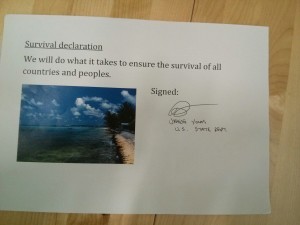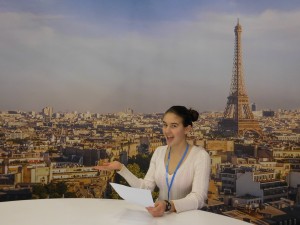Approaching the halftime of the negotiations, there is a distinctive spectrum of perspectives visible from within the US delegation. On one hand, the youth delegation from the US is very optimistic and impassioned, taking the initiative to cooperate on actions with youth representatives from around the world as part of the YOUNGO youth constituency, trying to push for the US to take bigger and bolder commitments in terms of emissions targets, financial contributions, and overall willingness to commit to the hopefully binding legal agreement that is still in the works. On the other hand, the negotiation-facing side of the US delegation has had to deal with a far less progressive reality, mainly because of a much different type of climate problem back home.
Although President Obama has come to Paris seemingly committed to take action on preventing climate change, he still has to defer to the approval of politicians at home. If a legally binding text were produced as a result of the COP21, it would need a supermajority (⅔ of the total members) from the Senate to be able for President Obama to sign it into law. Given that there is currently a Republican majority within the Senate that definitely doesn’t think of climate change as an important topic (or in some cases, a reality), the chances of the US signing a legally binding agreement are ostensibly low. Additionally, the US made a pledge of $3 billion towards the Green Climate Fund in November, but that pledge may not be realized for similar political reasons. To that end, there have been rumors/accusations that the US has been using delaying tactics, slowing down the talks, and trying to push the negotiations away from a legally binding agreement towards a more provisional text that can be ratcheted up over subsequent years. Coming into the talks, the US was prepared to settle for a legally binding 5-year review, but is in limbo about the other conditions.
To engage with the delegation, we participated as youth representatives in an action organized by the Australian Youth Climate Coalition. Young participants from all countries were supposed to ask their national party negotiators at COP to sign a declaration to support the Climate Vulnerable Forum and small island states with their demand of a 1.5 degree target warming. The declaration had these words: “We will do what it takes to ensure the survival of all countries and peoples.” If the leaders agreed to sign they received a placard that they could use in the plenary saying “survival is our priority.” As the only US people interested we were given the seemingly impossible task of entering the US control booth with the bold proposal. After practicing our elevator speech a couple times together we approached the booth. As we tried to find a suitable delegate to ask to sign the pledge, we had a couple of run-ins with staff members who seemed to be somewhat dismissive of our purpose. They attempted to get us to come back later, but we insisted that it was youth and future generations day and that we needed our representatives to hear our voices that day and eventually our persistence paid off. We were finally introduced to Jesse Young, a senior advisor at the U.S. Department of State. He was genuinely interested in meeting youth. He listened to our spiel and then, to our amazement, ran back in his office to grab a pen to sign it.

In addition to signing the pledge, Jesse also gave us a quick, but thorough rundown of how the negotiations were proceeding which we have boiled down into these main points:
The negotiations are going more slowly than expected but progressing, although there is some frustration among the delegates.
Laurent Fabius, President of the COP21 has asserted that he wants to complete the draft version of the Paris agreement by next Monday so that the rest of the week can be spent refining the text before the closing of the COP sessions
The US is now supporting the addition of a Loss & Damages section in the text, which is historically unprecedented in the COP negotiations
At 6pm this Saturday the ADP (Paris Text) was closed. This means that there can be no longer additions to the current 48 page document, just deletions and removal of brackets. This seems quick, but yet again this text has been in the works for years. A liaison to the COP president reported today that the most important issues to resolve next week include: equity and differentiation. Finance remains the main sticking point, however. The hope is to tackle the most difficult issues first. There has been surprising progress, however, in regards to loss and damage as well as pre-2020 climate action. Saudi Arabia and Venezuela remain unflinching when talks threaten their oil profits. They have both opposed decarbonization in the negotiation space. With hardly any break, higher level negotiating sessions will start Sunday afternoon.
And that concludes week 1 and our time at the COP21. Tomorrow morning, we head back to Philadelphia, passing the baton on to the new Swarthmore delegation (Professor Ayse Kaya, Stephen O’Hanlon, Anita Desai, and Nathan Graf). As we head back to Swat, we are eager to continue keeping up with the proceedings and hearing about how week 2 unfolds.
Au Revoir,
Dakota & Indy



Great summary. Regarding the legal options for the US to sign a legally binding agreement, it turns out that there is plenty of historical precedent for binding international agreements that are not treaties. But it depends on the nature of the commitments within the agreement. Here’s a summary of the history and the circumstances under which different kinds of agreements might be acceptable:
http://www.c2es.org/publications/brief-legal-options-us-acceptance-new-climate-change-agreement
In regards to your point on the US legislature passing a bill to combat climate change, and also pulling out the conversation with the Comoros representative, do you believe that after this upcoming election, the US’s action against climate change will become more proactive if we elect a republican leader? Do you believe that the changing of president’s will have a profound impact on the US’s standing on climate change at all?
I am afraid I think that the political issues will always be difficult to overcome.
Hello Isabelle and Sydney!
Generally speaking, yes, I think you’re correct that a more conservative presidency could undermine much of United States climate action. Here’s a piece describing ways a conservative president could undermine Obama’s Clean Power Plan, without which, we have little hope of fulfilling our Intended Nationally Determined Contribution commitment.
http://grist.org/climate-energy/heres-how-a-republican-president-could-undermine-the-clean-power-plan/